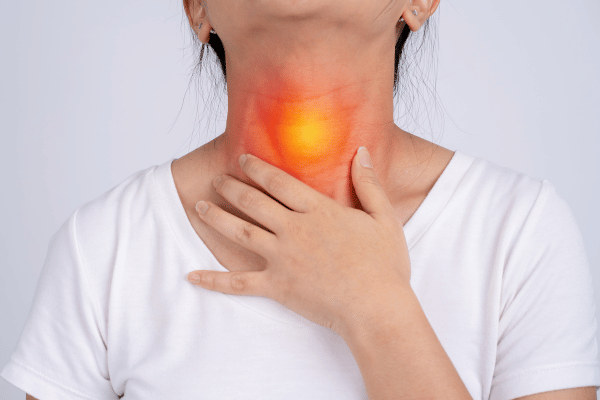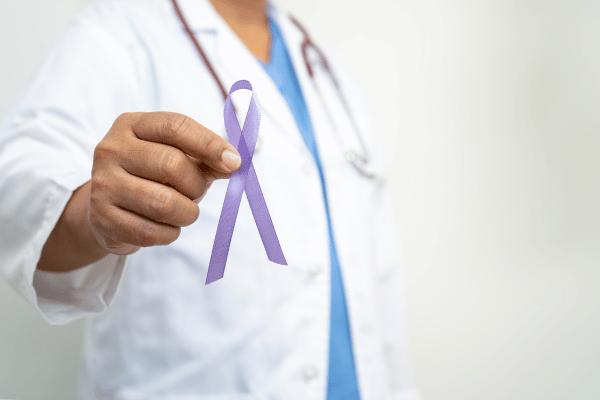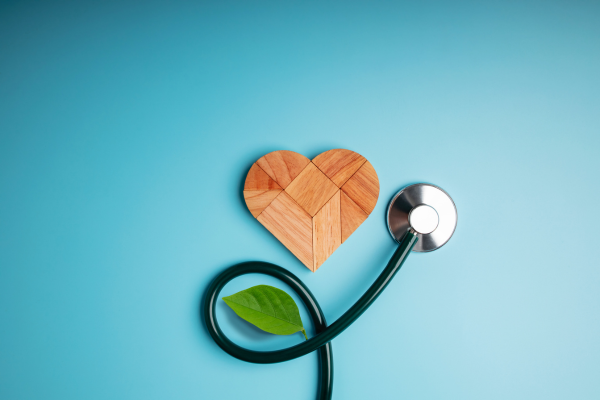Esophageal cancer is a type of cancer that affects the esophagus, the muscular tube that connects the throat to the stomach. This cancer is relatively rare but is highly aggressive and can be fatal if not detected and treated early. As with any form of cancer, mitigating your risk where possible is one of your best strategies for remaining in good health.
When it comes to the risk factors of esophageal cancer, they fall into two familiar categories: Risks you can avoid, and risk you likely cannot control.
Esophageal Risk Factors You Can Avoid
Lifestyle choices – and changes to them – can help you ensure you live a longer and healthier life. Here are some of the variables to consider and adjust accordingly.

Tobacco Usage and Esophageal Cancer Risk
Stop us if you’ve heard this one before.
Tobacco products, including cigarettes, cigars, pipes, chewing tobacco, and all forms of smoking or smoke-less tobacco, pose a major risk factor for esophageal cancer (among literally dozens of other ailments). As can be expected, the higher the frequency and length of time tobacco products are used by an individual, the higher degree of risk that individual has of contracting some form of cancer.
How severe is the risk? According to the American Cancer Society, someone who smoked a pack of cigarettes a day exposes themselves to at least twice the chance of contracting adenocarcinoma of the esophagus. And here’s the kicker: the risk does not go away if you quit using tobacco cold turkey! However, quitting today may prevent your risk from becoming even more severe.
Alcohol Usage
Consuming excessive amounts of alcohol over a prolonged period of time increases the risk of esophageal cancer. At a minimum, moderation of alcohol consumption is highly advised to most effectively manage the risk of getting an esophageal cancer diagnosis, among other diseases.
Obesity
Obesity is a risk factor for many types of cancer, including esophageal cancer, because people who are obese are more likely to have gastroesophageal reflux or GERD, a significant driver of esophageal cancer we will discuss more in depth later.
Diet
A diet lacking in fruits and vegetables and high in processed foods and red meat may increase the risk of esophageal cancer.
Also, be mindful of the temperature of your beverages. Studies have shown regularly drinking liquids above 149° F can increase the chances of an individual developing esophageal cancer due to damage done to the lining of the organ .
Physical Inactivity
Diet and exercise commonly go hand-in-hand in promoting a lifestyle exemplified by good health and avoidance of illness. A sedentary lifestyle invites elevated risk for being diagnosed with a multitude of maladies.
Esophageal Risk Factors You (Probably) Cannot Avoid

Even with the best of intentions and efforts, biology and heredity can be your worst enemies. There are no absolutes, but here are some risk factors you should be aware of that most likely are out of your control.
Age
Esophageal cancer is more common in people over the age of 50, and the risk continues to increase with age. It is highly uncommon among younger people with fewer than 15% of diagnoses occurring in people under age 55.
Gender
Men are more likely to develop esophageal cancer than women. Sorry, gents.
Gastroesophageal Reflux Disease (GERD) and Esophageal Cancer Risk
GERD (Gastroesophageal Reflux Disease) People with GERD, a condition in which stomach acid backs up into the esophagus, are at an increased risk of developing esophageal cancer.
For most people, GERD causes symptoms such as heartburn or pain that seems to come from the middle of the chest. Also, the more frequent the symptoms the higher the risk. It is common, however, for GERD to exhibit no symptoms at all.
More importantly, while GERD is common, most people who experience it will not develop esophageal cancer.
Barrett’s Esophagus and Esophageal Cancer Risk
Simply put, Barrett’s Esophagus is a condition in which the cells lining the lower esophagus change and become abnormal over time as a result of sustained stomach acid reflux. This condition increases the risk of esophageal cancer.
As with GERD, people with Barrett’s Esophagus commonly experience symptoms of heartburn. Likewise, many people will experience no symptoms, and most people with Barrett’s Esophagus will never develop esophageal cancer.
History of Cancer
Previous cancer diagnoses can unfortunately open individuals up to contracting additional forms of the disease. For example, people who have had throat cancer, cancer of the mouth, or lung cancer may be at a higher risk of developing esophageal cancer.
Monitor Your Health. Seek Medical Advice if Necessary.
While there are other factors not covered here, such as Achalasia, Tylosis, Plummer-Vinson Syndrome and the Human Papillomavirus Virus (HPV), that may influence one’s susceptibility to esophageal cancer, we hope this provides a thorough understanding of the most common risk factors of which to be aware, and also make efforts to minimize or avoid entirely.
Esophageal cancer is a serious disease that can be caused by a variety of factors, and often the symptoms are so subtle they go unnoticed – even if they occur chronically. If you have any concerns about your risk of developing esophageal cancer, talk to a DHI gastroenterologist about appropriate screening and prevention strategies.
Don’t just be fine. Be sure! Schedule your appointment with a DHI Gastroenterologist
For your convenience, we have multiple locations throughout the Greater Lansing Community. Contact us today to request your appointment!

